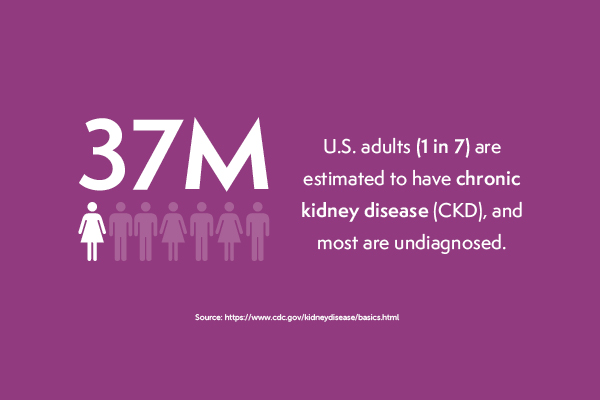Only about the size of your fist, your kidneys are essential to maintaining good health and removing waste and toxins from your body. Unfortunately, more than one in seven American adults has chronic kidney disease (CKD), that if left untreated, could lead to end-stage kidney disease (ESRD). By regularly eating a healthy diet, you can reduce your risk of developing chronic conditions, including those that raise your risk for CKD.
Facts about your kidneys
Your kidneys serve as a blood filtering organ and filter all the blood in your body every 30 minutes. As they filter out wastes from daily metabolism and ingested foods, they help regulate and maintain a proper fluid and chemical balance to produce urine. Along with waste removal, your kidneys:
- Help control blood pressure
- Stimulate production of red blood cells
- Keep bones healthy
- Regulate blood chemicals that are essential to life
For individuals with CKD, their kidneys are damaged and cannot filter blood properly, which results in a buildup of excess fluid and waste in the blood, potentially leading to other health problems. Kidney disease is often referred to as a “silent disease” because it typically does not have symptoms in its early stages and can go undetected until it is very advanced.
Risk factors for CKD
Some people may have a higher chance of developing CKD because of other health issues or conditions. In fact, approximately 1 in 3 adults with diabetes may have CKD. Common risk factors to be aware of include:
- Diabetes
- High blood pressure
- Heart disease
- Obesity
- Family history ok CKD
- Older age
- Inherited kidney disorders
- Past damage to the kidneys
Having kidney disease can also increase your chances of having heart disease and stroke. If CKD is left untreated, you can run the risk of kidney failure, early cardiovascular disease, or end-stage renal disease (ESRD), which often requires dialysis or a kidney transplant. The good news is that not all people with CKD will experience kidney failure, especially if action is taken to lower their risk factors, keep up with their medicine, work with their health care provider, and make important lifestyle changes like eating a well-balanced diet.
How nutrition can prevent and help manage kidney disease
Since nutrition plays an essential role in your overall health and well-being, making simple changes in the way you eat can prevent the progression of CKD and lower your risk of developing serious health conditions, like high blood pressure, high cholesterol, diabetes, hypertension and heart disease. Research has found that sticking to healthy dietary patterns is linked to a reduced risk of CKD progression and mortality in adults with the condition.
Along with keeping a healthy body weight, eating meals rich in fruits and vegetables, whole grains, fish, poultry, beans, low-fat dairy products and nuts is beneficial for promoting your kidney health and lowering your risk for other health conditions. A renal-friendly diet is low in fat, sodium, red meats, and added sugar. If you have CKD, it’s important to regularly monitor your potassium, phosphorus, protein and sodium levels, as high amounts can be taxing on your kidneys and increase your risk of complications.
By eating meals that help you maintain a healthy weight and keep your kidneys healthy, you have a better chance of preventing the development of serious health conditions, like CKD or slowing its progression. To help those looking to boost kidney health, Mom’s Meals® offers renal-friendly, ready-to-heat-and-eat meal options that are lower in sodium and saturated fat to help provide the proper nutrition for a healthier lifestyle.
Resource for you

Nutrition’s Impact on Kidney Health
Nutrition plays an essential role in one’s overall health and well-being. Get the white paper to find out how maintaining a nutritious diet has been shown to help prevent and slow the progression of kidney disease, as well as other chronic conditions that can affect your renal health.



